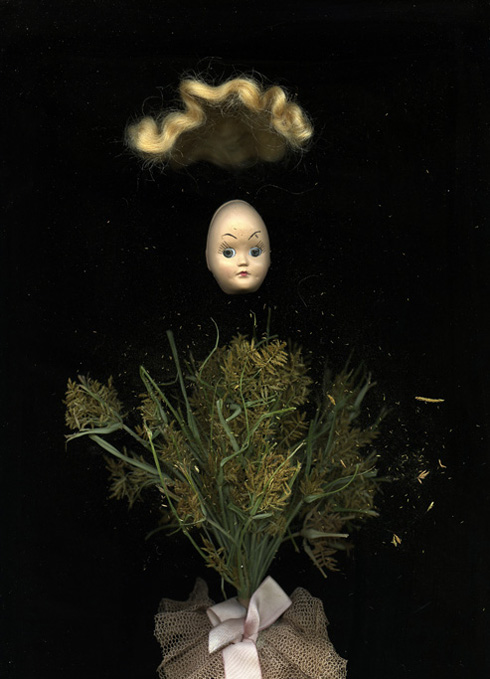 Leonard thinks he’s a bad-ass walking behind the casino, making his way over to the party. I’m the female answer to him and his Sioux style wrapped up cool in black boots. The music pumps loud and my feet want to fly, but I stay on the earth when I see him coming. He drives a red Ford Escort with tinted windows and has a tiny water drum hanging from the rearview mirror like the kind they sell at Shush Yaz in Gallup.
Leonard thinks he’s a bad-ass walking behind the casino, making his way over to the party. I’m the female answer to him and his Sioux style wrapped up cool in black boots. The music pumps loud and my feet want to fly, but I stay on the earth when I see him coming. He drives a red Ford Escort with tinted windows and has a tiny water drum hanging from the rearview mirror like the kind they sell at Shush Yaz in Gallup.
They built a casino in my cousin Jess’s backyard with blue-neon lights and machines making promises. Included in your neighborhood ticket: a view of the traffic coming across the bridge from Yuma, and a Kenny Rogers concert you don’t have to pay to hear. All our friends come and we stand around the fire in the cool Sonoran night, laughing and talking.
They built a casino in my cousin’s backyard. The government gave us neat HUD houses all in a row and we call it Easter Egg Lane with pasty pastel colors lining the street. It’s ugly and we figure they want us to be happy but not too happy. I got the shell of a cool blue and no one fights in my home but my cousin has the sick pale green of envy covering his walls and she likes to get a running start when she punches him.
They built a casino in my cousin’s backyard. As a little boy, Jess had ear infections and a soft fat face. I squeezed his sweaty palm in mine and thought I would always take care of him. Then he grew into an Indian Paul Bunyan and took care of me. He left once for college in Kansas on a football scholarship—but he liked to beat people off the field for practice. They said it was against the rule book and sent him home.
They built a casino in my cousin’s backyard and the gamblers or drinkers may have been the ones. No one knows for sure. She was just a little girl. Coming home, crying but refusing to say who. We knew right away what was wrong. She hid under her bed for hours. I tried to hold Jess back but he bucked, his long black hair in my hands like reins, and I couldn’t stop him.
They built the casino in my cousin’s backyard and he went down the street with a rifle in his hand. We shouted for him to come home and sit his chubby butt down. He’s still a little boy to me. He really is gentle despite his size, big hands balled and fierce dark eyes. Don’t let his disposition for unhappiness scare you. He won’t sit sweat with any white man and talks a lot of bullshit but underneath he’s still the kid with the earache and bright crow-like gaze.
They built the casino in my cousin’s backyard but he can’t see it from his prison cell in Southern California. He can’t see how her boyfriend rakes broken glass before parties so a game of tag can be played without the kids getting hurt. He can’t see the old barrel cut in half to make a grill or guess that Isaiah has started hunting again. He can’t know that we’re eating dove as we stare at the blue-neon lights or that we’re listening to Kenny Rogers bang on the Sonoran desert ceiling.
At least he gets his per capita check.
“When’s Jess getting out?” Ray asks every time we get together. His memory is short as a marine’s haircut.
Leonard arrives to distract us. He shrugs with that goofy smile and gives the official Fort Yuma handshake to everyone. He’s a serious kid; I noticed when we met at Arizona Western College. We started the same Rhetoric section last week.
“We’ll learn to argue like experts,” I say, throwing my napkin onto the heat. We watch as the bright lipstick in the shape of my mouth catches fire on the red-hot grill. The kids yell—“Not it!”—and I imagine what I thought I’d never imagine again: something right coming from this blue-lit backyard with its star-muffled sky.
—
Deborah Jackson-Taffa is a Native American writer, mother, and MFA student at the University of Iowa. Despite loving books and academic debate, she finds her favorite form of education in adventure travel and the great outdoors. Born to the Laguna/Kwatsan/Paiute/Chicano Nations, Deborah’s ancestral home is the desert Southwest. Her writing is a reflection of both her roots and her wings.
Artwork by Gabrielle Katina

2 comments
Andrew Willis says:
Oct 4, 2012
This is amazing. Some of the best Native American writing I’ve ever read.
The funny thing about Native American writing is that it is fluid, and changing, and adapting, and pieces of other stories that create new stories. Yet, somehow, it retains a voice of its own.
That voice is here in this essay. Amazing.
Debra S. Levy says:
Oct 6, 2012
What a wonderful essay, Deborah. I love the way you use the refrain, and that line — ” … we figure they want us to be happy but not too happy” — says everything. Looking forward to reading more of your work!